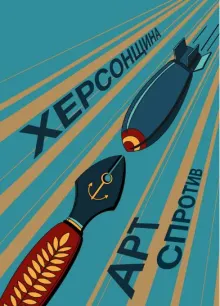
The Ukrainian city of Kherson has often been in the headlines since Russia launched its full-scale invasion of Ukraine in February 2022. Kherson was occupied in early March 2022, but many of us will remember inspirational footage of its citizens demonstrating against the Russian occupiers, waving Ukrainian flags and singing Ukrainian songs. September saw the Kherson Region (Khersonsʹka oblastʹ) claimed by Russia to have been legally annexed in an internationally condemned move, while Kherson’s liberation by the Ukrainian army took place in November. Recovering from months of occupation and destruction, Kherson then suffered seriously from flooding and pollution caused by the June 2023 destruction of the Kakhovka dam.
Our latest Slavonic item of the month is a 2023 anthology of poems by Kherson inhabitants about their city and region and the war. Khersonshchyna contains poems by 54 Kherson writers, some of them experienced and professional poets but many others of them amateurs. Brief biographical notes about the contributors come at the end of the book and demonstrate the wide variety of authors involved – the eldest was born in 1948 and the youngest in 2001. Everything included in the anthology relates directly to the 2022- Russian invasion and the writers’ experience of it: occupation, displacement, and liberation (the Kakhovka disaster took place after the book had been printed). Its front cover makes the book’s statement clearly and stylishly, showing an ink pen rising up to counteract a falling bomb. Inside, the book has a small section of pictures, including the two shown here – a March 2022 anti-occupation demonstration and a ruined book collection.
Amateur poetry rarely features among the UL’s purchases, but we have bought similar books before, such as a book of poems by the mothers of those killed in the Euromaidan protests. They add to our literary holdings but perhaps more importantly provide a form of primary source about the events they respond to.
Mel Bach



